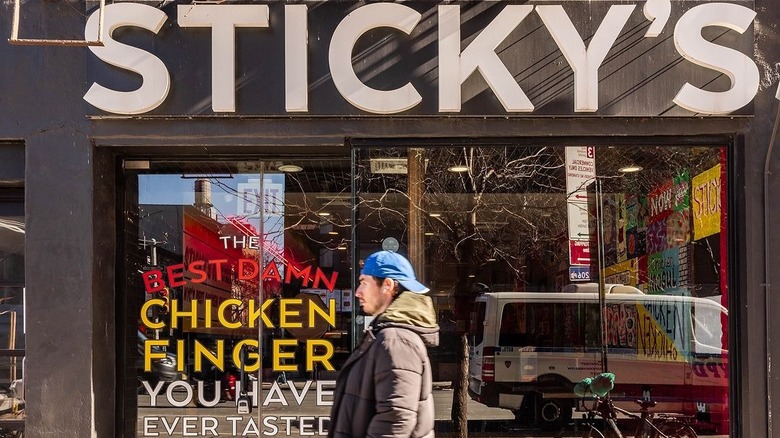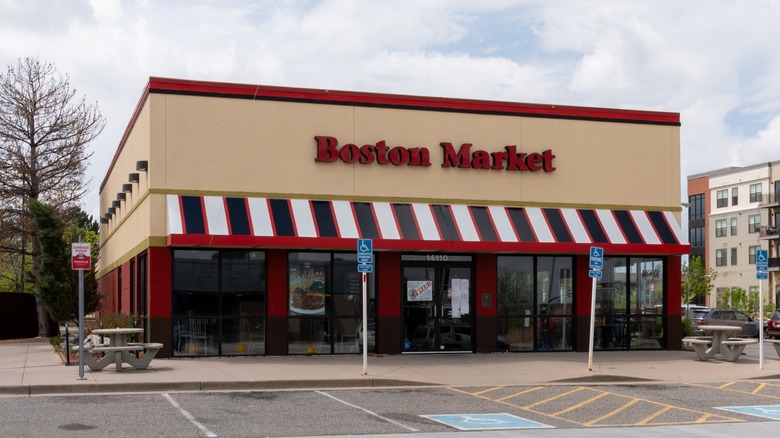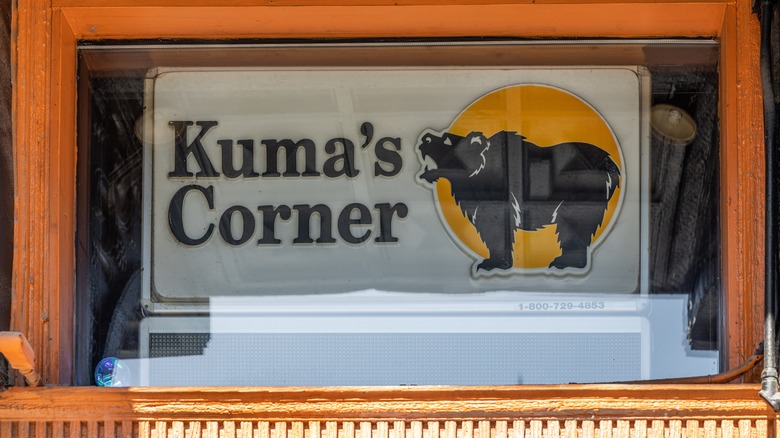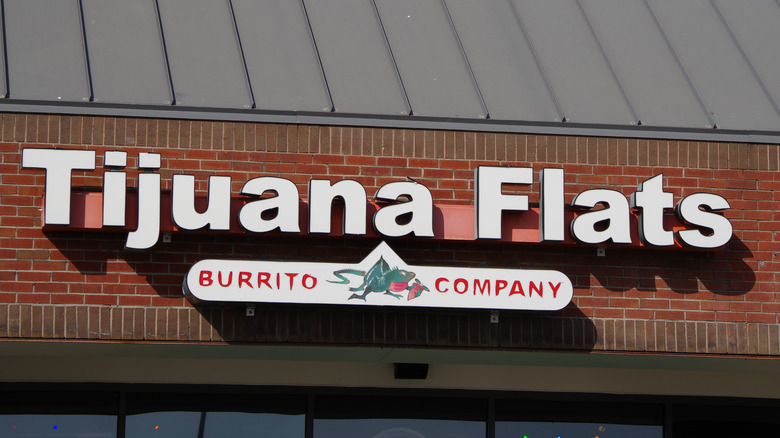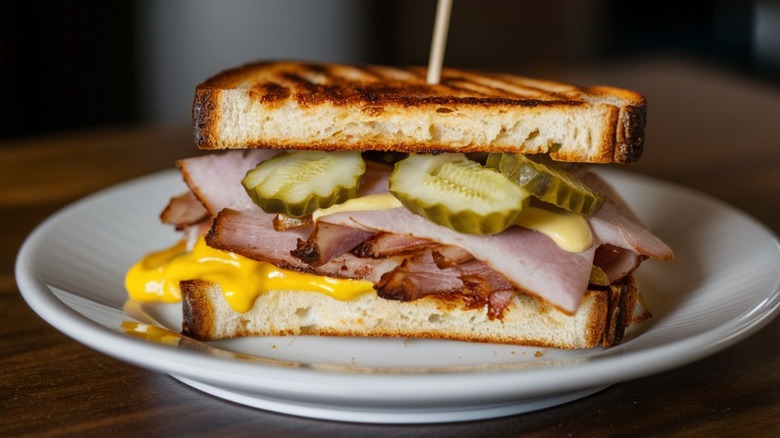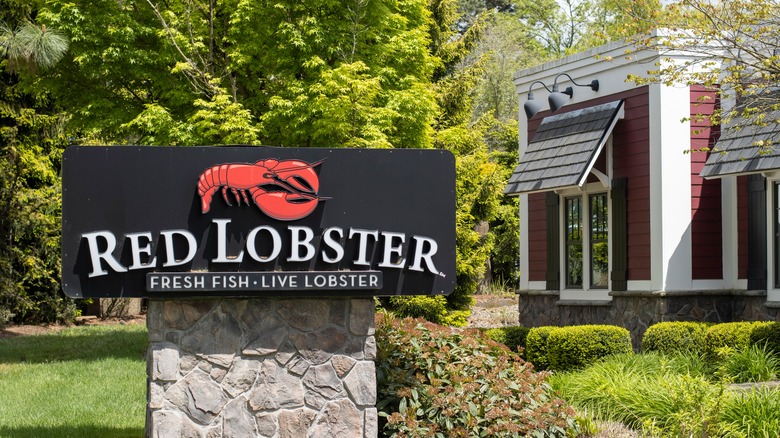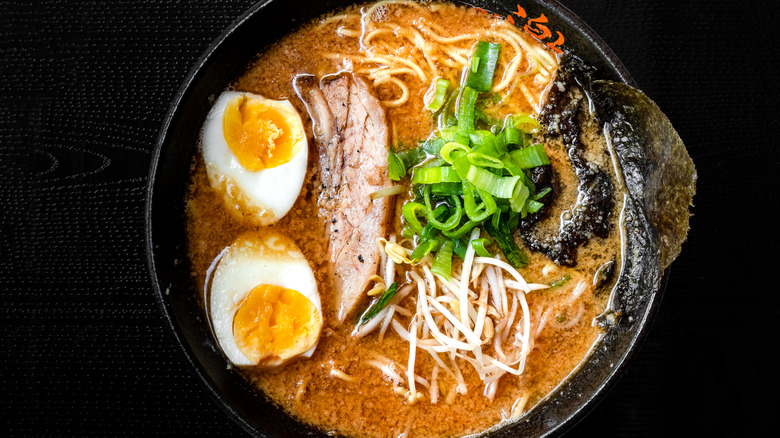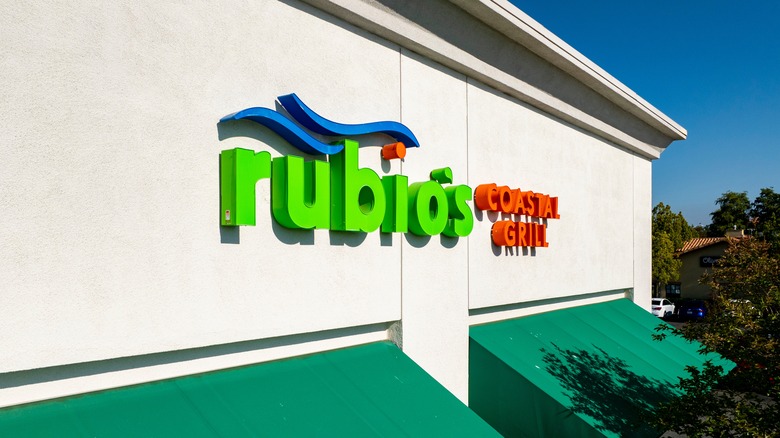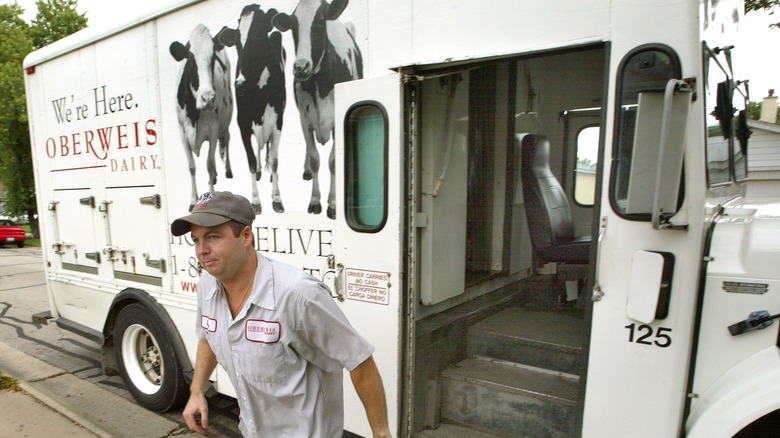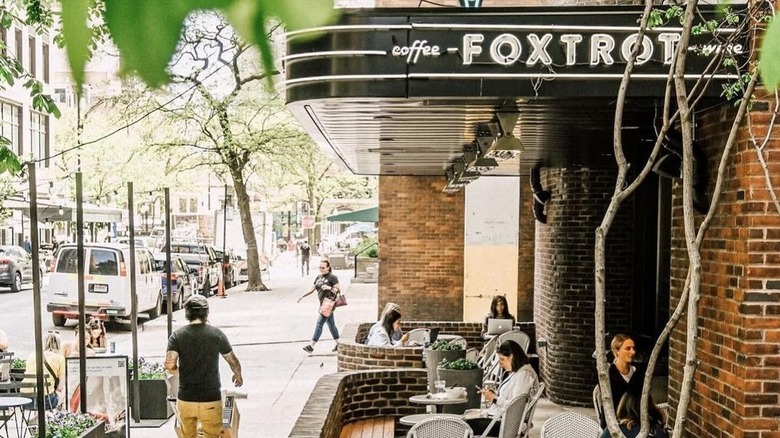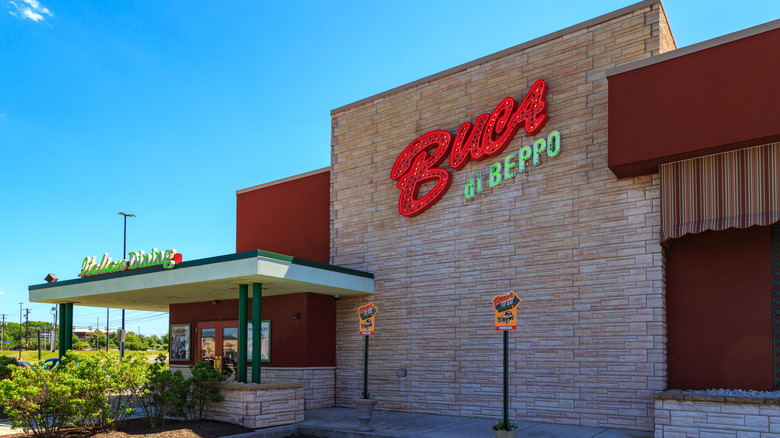Beloved Restaurant Chains Facing Bankruptcy In 2024
It's a known fact that COVID-19 restrictions and closures had an immense impact on the restaurant industry, specifically, independent mom and pop establishments with big overhead expenses and little outside support. Now that the pandemic has passed, you might be surprised to learn that a number of larger restaurant chains in 2024 have declared, or are on the precipice of, bankruptcy. The reasons for this include some of the usual suspects — the overhead coverage of food and employees, inflationary pressures adding to the higher cost of borrowing, and the tightening of extended credit from lenders and investors.
Another issue is fewer customers. According to the Vericast 2024 Restaurant TrendWatch via TB&P, as the cost of food rises an average of 5.1% per year for restauranteurs, 71% of Americans between the ages of 18 and 42 are choosing to eat at home more often. More than half of respondents, the equivalent of 67%, point to the rising cost of a restaurant meal as a motivator.
Chain restaurants' reliance on crazy discounts to get customers through the door, rather than customer service and diner experience, also creates negative gains since money that should be invested in hiring and training instead goes into the all-you-can-eat buffet. These chains face bankruptcy in 2024 — this is the story of how they got there.
Sticky's Finger Joint
Sticky's Finger Joint is a New York chicken tender chain that came out of the COVID-19 pandemic boasting 16 locations in The BIg Apple and New Jersey alone. With initial sales of $500,000 in 2013, the company expanded into a $22 million chain by 2023. Unfortunately, surviving the pandemic didn't allow the chain to escape the financial realities of inflationary pricing, lower sales due to lockdowns that decreased human traffic, and food delivery apps taking too big a bite of profitability. Add to that a myriad of legal snafus including a $600,000 judgement against the chain for abandoning properties before the end of lease agreements.
Also hitting the company accounts was a legal challenge around the name of the company — Sticky Finger — which it shared with separate chain Sticky Fingers Barbecue, which accused the chain of trademark infringement. Pandemic impacts and mounting debts in the range of $1 million to $10 million to legal firms, real estate companies, and food distributor U.S. Foods helped drag Sticky Finger Joint into Chapter 11 bankruptcy proceedings. Even accessing $2.42 million in equity financing wasn't enough to cover the chain's liabilities. Chapter 11 bankruptcy is a way for companies with high debt but valuable assets to buy time to restructure their business and chart a path to a balanced budget, manageable debt loads, and in the best case scenario, a return to profitability.
Boston Market
In 2023, rotisserie chicken chain Boston Market had no fewer than 300 restaurant locations. By March 2024, that number dwindled to 27 as the chain buckled under the weight of debts leading to evictions from properties and multiple lawsuits. Some properties have been shut down due to unpaid sales taxes. While the reported number of restaurants left standing as of March was 27, the owner of the chain, Jay Pandya, remained insistent the number of open restaurants were twice as much as was being reported — while not providing any proof or locations for these restaurants. This is just the tip of the iceberg where the trustworthiness of the owner is concerned.
The restaurant's story from the 1990s to present day has already involved one bankruptcy under different ownership, before being sold to McDonald's and sold again to Sun Capital. In 2020, Pandya bought the chain, bolstered by his experience as a Dunkin' and Pizza Hut franchise owner. Unfortunately, that was the last time Pandya appears to have paid a debt. The chain racked up 150+ lawsuits for unpaid bills and employee-related matters, including to distributor U.S. Foods, for $15 million. which the courts have recently ruled it owes. Pandya filed for Chapter 11 protection as an individual in December 2023 and again in January after the first filing neglected to mention two rental properties he owned as assets. The second bankruptcy filing was also terminated due to a missed deadline.
Kuma's Corner
If you were looking for an inexpensive date night idea anytime in the last 19 years, Kuma's Corner offered a cool vibe and reasonable price with craft beers and burgers named after metal and punk bands like the Black Sabbath or Goatsnake. In June 2024, the parent company of the popular Midwestern chain, Kuma's Holdings, filed for Chapter 11 bankruptcy. While its four locations are still in operation, the company is still bogged down with $3.5 million in total liabilities the owners attribute to the impact of COVID-19 lock downs.
Even with $58,000 in Federal pandemic support offered by the Payroll Protection Plan — an emergency stipend provided for small business owners that covers up to eight weeks of payroll and interest on operating expenses — and a $846,000 Emergency Disaster Loan from the Small Business Administration, Kuma's Corner still found itself in a situation where a restructuring of the company is a necessity. While not a liquidation, realistically, keeping the business running with all four remaining locations while paying off debts creates the possibility that restaurants may close. Of course, the owners hope to keep the remaining restaurants open as they steer the company through bankruptcy, while making the establishments more family friendly by lowering the volume of punk and metal music that used to blare through speakers.
Tijuana Flats
Tex-Mex chain Tijuana Flats was established in the mid-90s in Winter Park, Florida and had been a beloved Floridian institution ever since. But in April 2024, the company announced it was shuttering 11 restaurants — 10 in Florida and one in Virginia — leaving 65 chain restaurants and 26 franchises within four states. A spokesperson from the chain noted economic volatility and costs associated with running brick and mortar locations against the restaurants' overall financial performance as reasons for the closings. Tijuana Flats filed for Chapter 11 bankruptcy the same week, with the offloading of these 11 restaurants likely being part of its attempt to reorganize the company while they pay down debts.
While accurate accounting of debts owed by the chain isn't available, Tijuana Flats bankruptcy filing shows there are between 200 and 999 creditors with $10 million to $50 million in liabilities owed. There's evidence to suggest Tijuana Flats must have seen the writing on the wall as early as November 2023, when the chain began mulling over the idea of selling the company. Tijuana Flats got its wish the same month of the bankruptcy filing when Flatheads LLC acquired all its remaining restaurants from parent company TJF USA. The restaurants remain open while the chain attempts to reorganize the company under Chapter 11 and pay its creditors what it owes.
Melt Bar & Grilled
Melt Bar & Grilled has been serving up grilled goods since 2006 in its home state of Ohio. A year before the COVID-19 pandemic, the chain had been doing so well that it had average yearly sales of $18 million plus, had expanded to 13 restaurants, and was featured on The Travel Channel's "Man vs. Food" and The Food Network's "Diners, Drive-ins and Dives". This made a Chapter 11 bankruptcy filing in May 2024 all the more surprising. However, the economic impact of the pandemic and the government policies in response to it didn't do restaurant chains like Melt Bar & Grilled any favors. While the government attempted to offset the financial hit of the pandemic to small businesses with payroll support and disaster relief loans, in an industry with notoriously small margins and high overhead costs, chains with multiple restaurants like Melt Bar & Grilled still had challenges paying debts for each location.
Melt Bar & Grilled has been steadily closing restaurant locations since 2022 and has been sued by different landlords for failing to pay rent and other leasing expenses. In one instance, the company was sued for $220,000 by its landlord at Easton Town Center, in another, EW Hubbard High alleged $460,000 is owed. According to court documents, part of the restructuring efforts include selling off property — the chain is down to four locations — and unused equipment to make good on the $1 million to $10 million owed to creditors.
Red Lobster
Red Lobster is a classic casual dining restaurant that feels like it's been around forever. The chain is known as a place for cheap seafood and great deals like $20 all you can eat specials which, it turns out, may not have been such a great idea in hindsight. Like many restaurants, Red Lobster came out of the pandemic in 2022 behind on profits — $33 million behind, to be exact — due to the inflationary impact on food costs, dwindling customer base, and labor expenses. The chain began mulling over filing for Chapter 11 bankruptcy in April 2024 in an attempt to protect the company while it attempted to manage its debt load, with the possible intent of selling the chain altogether. With 650 outlets, the chain let go of 16 in order to make the restructuring efforts a reality.
To be fair, all of the establishment's problems probably can't be blamed on the pandemic. There are ways restaurants save money at their customer's expense, and Red Lobster has made the mistake of not really employing any of them. As far back as 2003, Red Lobster was making disastrous business decisions like offering an all-you-can-eat snow crab dinner for $22.99 that, while a boon for diners, added up to $3.3 million in losses for Red Lobster that quarter. In 2023, it offered a $20 all-you-can-eat deal for shrimp, this time losing $11 million. To date, the restaurant has since closed at least 106 restaurants.
Boxer Ramen
Portland, aside from being a city located in one of the most expensive states to live in the U.S., is also the birthplace of once popular ramen chain Boxer Ramen. The restaurant chain had expanded to four locations over the last decade, and until the COVID-19 pandemic, appeared to be headed in an upward trajectory. In a statement released on the businesses Instagram page in April, the chain spoke of the challenges presented by the pandemic, including inflationary pressures on the cost of goods and services and the public's lingering fear of restaurant dining as main factors for the chain's closure of all its restaurants. This was after an expansion effort into Beaverton, Oregon and Multnomah Village at the start of the year, and a Chapter 11 bankruptcy filing that followed the expansion news in February.
Even after owner, Micah Camden, secured a $300,000 loan from businessman and owner of Comfort Food Group, Angelo Lombardi, the chain was still too far under to be saved. Adding to the problems, the court rejected Camden's bankruptcy filing requesting an opportunity to restructure its debt while keeping the leases on its properties. In the court filing dated February 9, 2024, the restaurant noted it had established assets of $500,001 to $1 million while owing an estimated $1 million to $10 million to creditors.
Rubio's
There are crucial warning signs that a business is headed towards bankruptcy. Prior to the pandemic, fast-casual Mexican chain, Rubio's, was already showing some. The one-time 170 outlet chain had been struggling as far back as 2018, when the restaurant initiated a pivot — updated online ordering platforms, loyalty rewards, and an attempted sale of the company — that helped bring the company back to profitability by 2019. Then COVID-19 happened. By 2020, with 47% of the chain's sales tied to indoor dining, even after taking measures including temporarily shuttering 85 outlets, laying off 1,400 members of its workforce, and a 30% cut in pay for the remaining support center staff, the chain found itself $82.3 million in debt. By October of 2020, Rubio's was filing for Chapter 11 bankruptcy protection, requesting an opportunity to renegotiate its debt through a restructuring with parent company Mill Road Capital.
Although Rubio's survived the first bankruptcy, by the end of 2020 the rising cost of food and labor — the state of California initiated a minimum wage increase to $20 per hour for fast food employees — and food apps that ate up 30% of the online order sales forced the chain to take on more debt. By the end of March 2024, the company had amassed $70 million in debt. Another Chapter 11 filing in May 2024 to protect its assets until a sale of the business could be facilitated included an estimated $100 million to $500 million in liabilities.
Oberweis Dairy
Oberweis Dairy is a beloved chain that had fanned out to 40 locations but couldn't scoop enough ice cream to save itself from Chapter 11. The family-run chain filed for bankruptcy in April of this year, citing changing consumer tastes — a shift away from traditional ice cream to non-dairy, plant-based options — and spending too much on distribution and not enough on production. These missteps led to less customer foot traffic, which also didn't help. In 2023, the family owners sought the help of an investment advisor to help them find a buyer for the company, but that didn't pan out for Oberweis, which became another factor in the bankruptcy filing this year. In order to keep the chain alive, it planned to lay off 127 employees and close its plant in North Aurora to tighten the gap on the $4 million it owed to 20 creditors.
However, in May of this year, a private equity firm — Osprey Capital, investment arm of the Hoffmann Family of Companies — stepped in to purchase Oberweis Dairy during a bankruptcy auction. The firm has plans to not only keep the North Aurora plant open, but upgrade it for expanded production capability. While there's no word on whether the firm will bring back any of the employees laid off, the Oberweis family can be secure in the knowledge the chain will live on.
Outfox Hospitality formerly Foxtrot and Dom's Kitchen & Market
Outfox Hospitality is the parent company of urban convenience store and eatery Foxtrot, and upscale grocer and made-to-order food market, Dom's Kitchen & Market. The company came out of a merger between the two food chains in 2023, which believed the combination of wine and food brands would disrupt the industry. After the merger, data analytics firm Placer.ai even named Foxtrot a top 10 brand to watch in 2024. With 33 locations across three states, nobody could have predicted a Chapter 7 bankruptcy filing in 2024 for the amalgamated chains — including their employees who were laid off without warning in April and filed a class action lawsuit against Outfox Hospitality for not providing compensation or notice.
Chapter 7 bankruptcy is when a business sells off its assets to pay creditors, with any outstanding debt being written off at a loss to the creditors. It's usually the bankruptcy filing of last resort for a business or individual without the means or liquid assets to pay back debt. In this case, Foxtrot was forced to liquidate its assets for $2.2 million this year in order to pay its estimated 5,001 to 10,000 creditors part of an estimated $10 million to $50 million — an amount equivalent to the chain's assets. Unlike some beloved retail chains that filed for bankruptcy — here's looking at you, Blockbuster — Foxtrot announced plans to reopen locations in Chicago, Dallas, and Austin in 2024.
Buca di Beppo
Founded in 1993, casual Italian dining chain Buca di Beppo, went public in 1999 and was embroiled in an SEC investigation where senior leadership was discovered defrauding the company of over $1 million dollars while inflating the business' stated income by $12 million between 2000 and 2004. Despite that bump in the road, the chain was acquired by Planet Hollywood International in 2008 and grew to 95 outlets by 2014. The favorite dining spot for lovers of family-style meals and kitsch ran into serious financial trouble in 2020. Like most of the chains on this list, the pandemic had a disastrous impact on the restaurant's financial fortunes. All the same culprits — rising inflation's effect on food and labor, and a reduction in diners — came to haunt the chain as it tried to maneuver its way to financial health by closing more than half its locations.
Steadily declining sales from 2021 onward have left Buca di Beppo with 18% less earnings than in 2023. The chain filed for Chapter 11 bankruptcy protection this July in an attempt to restructure and pay down debt to its creditors. It's estimated the company owes over $10 million with as much as $1.36 million of that amount representing unredeemed gift cards possessed by customers. The restaurant chain currently has 44 locations left open.

